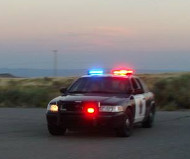Article from: www.thenewspaper.com/news/62/6297.asp
9/19/2017
New Mexico: Federal Judge Slaps Down Implausible Traffic Stop
US district court judge does not believe cop who claims he used his mirror to witness a car impeding traffic half-a-mile away.
 Prosecutors around the country have been pushing the limits with the reasoning used to justify traffic stops. Ever since the US Supreme Court's Heien ruling (view case) gave the green light to police to be wrong about the law when pulling over motorists, rulings that result in suppression of evidence have grown increasingly rare. Last week, a federal judge in New Mexico decided that prosecutors had pushed too far.
Prosecutors around the country have been pushing the limits with the reasoning used to justify traffic stops. Ever since the US Supreme Court's Heien ruling (view case) gave the green light to police to be wrong about the law when pulling over motorists, rulings that result in suppression of evidence have grown increasingly rare. Last week, a federal judge in New Mexico decided that prosecutors had pushed too far.
On June 3, 2016, Deputy Leonard R. Armijo was looking to write tickets on Interstate 40 in Bernalillo County when he spotted in his rear view mirror a Chevrolet Tahoe SUV driving in the slow lane a half-mile back. He claims he noticed a commercial truck behind the Tahoe swerve and change lanes, which he believes was caused by the Tahoe's traveling at 61 MPH on an uphill stretch of the 75 MPH freeway. Once over the hill, the Tahoe hit 72 MPH, according to the deputy's radar.
The deputy stopped the vehicle and began writing a ticket for driving too slowly to Rudis Alexander Cornejo, who was carrying nine illegal aliens with him at the time. The court was only asked to rule on whether the traffic stop itself was valid, and US District Judge M. Christina Armijo (no relation to the deputy) found the prosecutor's arguments entirely implausible.
"At a distance of one-half mile (several football fields long), Deputy Armijo, glancing through a rearview mirror when he was otherwise required to look forward and attend to the traffic flow on a busy interstate, could not plausibly have discerned why the commercial truck changed lanes," Judge Armijo ruled. "For example, the deputy gave no consideration as to whether the commercial truck was speeding or was following too close to the Tahoe."
US Attorney James D. Tierney tried to argue that, under the Heien precedent, the stop was valid even if the deputy was wrong about the minimum legal speed on Interstate 40. Again, the court held firm.
"The government's 'mistake of law' argument is essentially a reiteration of its position on reasonable suspicion," Judge Armijo ruled. "The court, having fully addressed the reasonableness of Deputy Armijo's suspicion, declines to consider the matter further."
As a last ditch effort to save the case, Tierney argued that the deputy would continue pulling over cars for the same "violation," even if the evidence were suppressed in this case. Judge Armijo, a President George W. Bush nominee, rejected the idea.
"To accept the government's cost-benefit argument in the context of this case would be to vitiate the Fourth Amendment's protection against unreasonable seizures," the judge concluded. "Deputy Armijo violated defendant's Fourth Amendment right to be free from an unreasonable seizure... To the extent that Deputy Armijo would do so again, undeterred by the court's determination that the stop was unconstitutional does not bear on the propriety of suppressing the evidence."
A copy of the judge's order is available in a 75k PDF file at the source link below.
Source: US v. Cornejo (US District Court, New Mexico, 9/11/2017)
Permanent Link for this item
Return to Front Page
 Prosecutors around the country have been pushing the limits with the reasoning used to justify traffic stops. Ever since the US Supreme Court's Heien ruling (view case) gave the green light to police to be wrong about the law when pulling over motorists, rulings that result in suppression of evidence have grown increasingly rare. Last week, a federal judge in New Mexico decided that prosecutors had pushed too far.
Prosecutors around the country have been pushing the limits with the reasoning used to justify traffic stops. Ever since the US Supreme Court's Heien ruling (view case) gave the green light to police to be wrong about the law when pulling over motorists, rulings that result in suppression of evidence have grown increasingly rare. Last week, a federal judge in New Mexico decided that prosecutors had pushed too far.